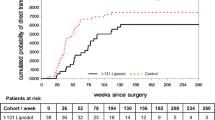Abstract
Background
Resection of hepatocellular carcinoma (HCC) is potentially curative; however, recurrence is common. To date, few or no effective adjuvant therapies have been adequately investigated. This study evaluates the efficacy of adjuvant iodine-131-lipiodol after hepatic resection through the experience of a single-center hepatobiliary service of managing this disease.
Patients and methods
All patients who underwent hepatic resection for HCC and received adjuvant iodine-131-lipiodol between January 1991 and August 2009 were selected for inclusion into the experimental group. A group composed of patients treated during the same time period without adjuvant iodine-131-lipiodol was identified through the unit’s HCC surgery database for comparison. The endpoints of this study were disease-free survival and overall survival.
Results
Forty-one patients who received adjuvant iodine-131-lipiodol after hepatic resection were compared with a matched group of 41 patients who underwent hepatic resection only. The median disease-free and overall survival were 24 versus 10 months (P = 0.032) and 104 versus 19 months (P = 0.001) in the experimental and control groups, respectively. Rates of intrahepatic-only recurrences (73 vs. 37%; P = 0.02) and surgical and nonsurgical treatments for recurrences (84 vs. 56%; P = 0.04) were higher in the experimental group compared to the control group.
Conclusion
The finding of this study corroborates the current evidence from randomized and nonrandomized trials that adjuvant iodine-131-lipiodol improves disease-free and overall survival in patients with HCC after hepatic resection. The lengthened disease-free survival after adjuvant iodine-131-lipiodol allows for further disease-modifying treatments to improve the overall survival.



Similar content being viewed by others
References
Jemal A, Siegel R, Ward E et al (2009) Cancer statistics, 2009. CA Cancer J Clin 59:225–249
Lavanchy D (2009) The global burden of hepatitis C. Liver Int 29 Suppl 1:74–81
Lavanchy D (2005) Worldwide epidemiology of HBV infection, disease burden, and vaccine prevention. J Clin Virol 34 suppl 1:S1–S3
Llovet JM, Bruix J (2000) Early diagnosis and treatment of hepatocellular carcinoma. Best Pract Res Clin Gastroenterol 14:991–1008
Poon RT, Fan ST, Lo CM et al (2004) Improving perioperative outcome expands the role of hepatectomy in management of benign and malignant hepatobiliary diseases: analysis of 1222 consecutive patients from a prospective database. Ann Surg 240:698–708 (discussion 708–710)
Yoo HY, Patt CH, Geschwind J-F et al (2003) The outcome of liver transplantation in patients with hepatocellular carcinoma in the United States between 1988 and 2001: 5-year survival has improved significantly with time. J Clin Oncol 21:4329–4335
Poon RT, Fan ST, Lo CM et al (2007) Difference in tumor invasiveness in cirrhotic patients with hepatocellular carcinoma fulfilling the Milan criteria treated by resection and transplantation: impact on long-term survival. Ann Surg 245:51–58
Katz SC, Shia J, Liau KH (2009) Operative blood loss independently predicts recurrence and survival after resection of hepatocellular carcinoma. Ann Surg 249:617–623
Nathan H, Schulick RD, Choti MA et al (2009) Predictors of survival after resection of early hepatocellular carcinoma. Ann Surg 249:799–805
Llovet JM, Bruix J (2008) Novel advancements in the management of hepatocellular carcinoma in 2008. J Hepatol 48:S20–S37
Raoul JL, Boucher E, Roland V et al (2009) 131-Iodine lipiodol therapy in hepatocellular carcinoma. Q J Nucl Med Mol Imaging 53:348–355
Lau WY, Leung TW, Ho SK et al (1999) Adjuvant intra-arterial iodine-131-labelled lipiodol for resectable hepatocellular carcinoma: a prospective randomised trial. Lancet 353:797–801 (see comment)
Ng KM, Niu R, Yan TD et al (2008) Adjuvant lipiodol I-131 after curative resection/ablation of hepatocellular carcinoma. HPB (Oxf) 10:388–395
Madsen MT, Park CH, Thakur ML (1988) Dosimetry of iodine-131 ethiodol in the treatment of hepatoma. J Nucl Med 29:1038–1044
Lau WY, Lai EC, Leung TW et al (2008) Adjuvant intra-arterial iodine-131-labeled lipiodol for resectable hepatocellular carcinoma: a prospective randomized trial-update on 5-year and 10-year survival. Ann Surg 247:43–48
Pocock S, White I (1999) Trials stopped early: too good to be true? Lancet 9157:943–944
Boucher E, Corbinais S, Rolland Y et al (2003) Adjuvant intra-arterial injection of iodine-131-labeled lipiodol after resection of hepatocellular carcinoma. Hepatology 38:1237–1241 (see comment)
Tabone M, Vigano L, Ferrero A et al (2007) Prevention of intrahepatic recurrence by adjuvant (131)iodine-labeled lipiodol after resection for hepatocellular carcinoma in HCV-related cirrhosis. Eur J Surg Oncol 33:61–66
Llovet JM, Ricci S, Mazzaferro V et al (2008) Sorafenib in advanced hepatocellular carcinoma. N Engl J Med 359:378–390 (see comment)
Conflict of interest
No author has any conflict of interest.
Author information
Authors and Affiliations
Corresponding author
About this article
Cite this article
Chua, T.C., Saxena, A., Chu, F. et al. Hepatic resection with or without adjuvant iodine-131-lipiodol for hepatocellular carcinoma: a comparative analysis. Int J Clin Oncol 16, 125–132 (2011). https://doi.org/10.1007/s10147-010-0143-9
Received:
Accepted:
Published:
Issue Date:
DOI: https://doi.org/10.1007/s10147-010-0143-9




